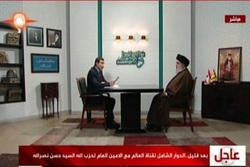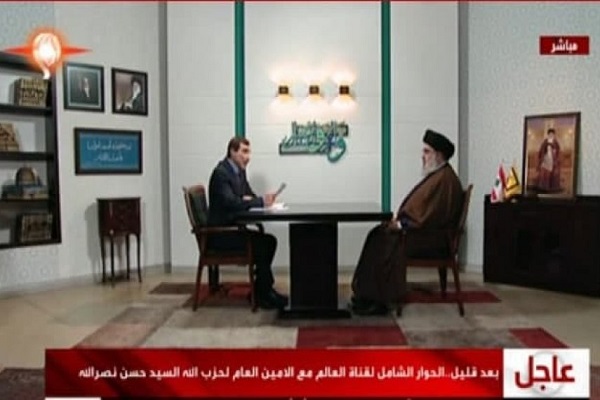True Islam Origin of Iran’s Islamic Revolution: Nasrallah


It was “true Islam” that brought about the Islamic Revolution because “it is true Islam that stands up to oppression and atrocity,” Sayed Hassan Nasrallah said in a live interview on Tuesday with Iran’s Arabic-language al-Alam news network.
“This is the exact thing that the US does not brook,” he stated, noting that Washington’s enmity towards Tehran is rooted in the emergence of an independent establishment in Iran that enjoys popular sovereignty.
He said the revolution successfully cut the hands of the United States and the Israeli regime off Iran.
“The Islamic Revolution pushed Israel and the US out of Iran,” Nasrallah said, as Iranians are celebrating the 43rd anniversary of the 1979 Islamic Revolution, which toppled the US-backed Pahlavi regime.
“Today, the Islamic Republic is the model of independence and freedom across the Islamic world and the entire world, while before the Revolution, Iran was controlled by the US,” he said.
The Hezbollah chief added that the Islamic Republic of today is a “great regional power” that cannot be simply ignored or fought off.
US, Israel fearful of war with Iran
Today, the United States is fearful of engaging in a war with Iran since the Islamic Republic is a strong and sovereign country, Nasrallah said, downplaying Washington’s warmongering tone concerning the Islamic Republic.
Neither is the US capable of stopping Iran’s peaceful nuclear energy program.
Any military action by the Israeli regime against Iran too would be met by “a very intense and harsh” response on the part of the Islamic Republic. “[Therefore,] the Israeli regime [too] is afraid of Iran’s reprisal.”
“Iran is not on joking terms with anyone. It will retaliate [for any military action.”
Israel unsure of war with Hezbollah
The Israeli regime, Nasrallah noted, would never be capable of reaching its goals concerning Hezbollah through warfare.
“Were the Israeli regime certain that it would be victorious in a [potential] war with Hezbollah, it would not hesitate for even a moment [to launch such a war],” he said.
The resistance movement is, however, not afraid of war and does not surrender in the face of threats either, said the official and asserted that the resistance’s approach rests in “deploying whatever weapon to confront the Israeli threats.”
Hezbollah has activated its air defense systems to confront the Israeli regime’s incessant violations of the Lebanese airspace, something that has “greatly reduced” the breaches.
Resistance is Iran, Hezbollah’s linking force
What links Iran and Hezbollah is the issue of resistance, which is a “national interest,” Nasrallah said.
He, meanwhile, roundly rejected allegations that the Iranian Embassy in Beirut intervenes in any fashion in Hezbollah’s decision-making procedures.
Lebanon vs. US pressure
Lebanon, however, is under “destructive American political, economic, and financial pressure,” Nasrallah said.
The US also tries to intervene in Lebanon’s security and military affairs, he added, calling the American Embassy in Beirut the US Central Intelligence Agency (CIA)’s “headquarters for the entire region.”
Following the 2000, Nasrallah noted, the Americans approached the movement, proposing financial incentive in exchange for its dropping its support for the Palestinians and quitting resistance in the face of the Israeli regime, Nasrallah said.
Washington’s pressure has never managed to impede Hezbollah’s struggle, though, he asserted.
'UAE's glassy hopes'
The Hezbollah chief went on to address the ongoing Saudi Arabia-led and United States-backed war on Yemen.
The Emirates is Saudi Arabia’s main ally in the 2015-present war and simultaneous siege that the kingdom has been leading against Yemen in order to change the impoverished country’s ruling structure. The war has killed tens of thousands of Yemenis and turned the entire country into the scene of the world’s worst humanitarian crisis.
The Yemeni forces that feature the army and its allied fighters from the Popular Committees have, however, vowed not to lay down their arms until the country's complete liberation from the aggressors.
In the space of a single month, the forces have launched at least three rounds of counterstrikes against the UAE’s sensitive spots, using drones and ballistic missiles.
Nasrallah reminded that the United Arabia Emirates has, since its creation, spent billions of dollars on buying advanced missiles, warplanes, and other types of foreign weaponry.
However, Abu Dhabi “sounded a clarion call for help” from the US, the UK, and France, and even the Israeli regime, in its first confrontation with the Yemeni defense forces, he noted.
“The Emirati government has sought support from the world’s superpowers and the Israeli regime,” Nasrallah said.
“They build their hopes on sand and, in the best-case scenario, on glass."
Nasrallahah strongly advised Abu Dhabi to wind down its involvement in the Saudi war to resolve the “security crisis” that it has come to face.
Yemeni officials themselves have also warned the Emirates about the potential of “more painful” responses should Abu Dhabi retain its engagement in the war.
Nasrallah also noted that the Saudi-led coalition has been intensifying its attacks against Yemen to prevent liberation of the strategic west-central province of Ma’rib.
The joint Yemeni forces have made great strides towards liberation of Ma’rib, whose freedom from the scourge of the invasion is expected to pave the way for, what Nasrallah described as, “the defeat of the Saudi-American coalition.”
Source: Press TV



